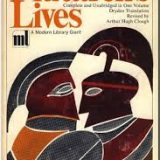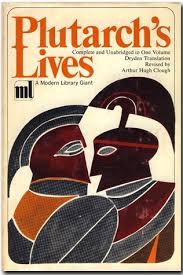Lives – Plutarch – 80 A.D~
Reviewed by: Michael Sympson Date: 25 October 2001
After the Turks had conquered Constantinople refuges brought manuscripts of Plutarch to Italy. It was the right time. Secular scholars and enlightened clerics took a new interest in the learning of Antiquity and the Greek language. For the first time since the fall of Rome, Homer was not just a name, but actually read in the original. And Plutarch’s “Lives” became the handbook for the European gentleman’s higher education. In fact through many channels, Plutarch reintroduced the ancient concepts of republican freedom and democracy to a world that seemed to have completely forgotten that they ever existed.
Plutarch became the United States secret founding father; Thomas Jefferson and the under-signers to the constitution, they all had grown up with Plutarch on their school desks. He infused them with the spirit of democracy: “For all we know, opposite parties or factions in a commonwealth, like passengers in a boat, serve to trim and balance the unsteady motions of power; whereas if they combine and come all over to one side, they cause to overset the vessel and carry down everything.” And he conveyed a grasp of the larger picture: “Economy, which is but money-making, when exercised over men, becomes policy.”
With Plutarch, liberalism raises its voice and in Tiberius Gracchus’ (163-133 B.C.) speech, he recorded for us this timeless indictment of “conservative values” and “patriotism:” “… The beasts find refuge in their dens, but men who for the safety of their country expose their lives in service, breathe on borrowed air in the open day. Having no roof of their own, with wive and children, they wander from place to place. Is it not ridiculous to hear generals exhort their soldiers to fight for the hearth of their ancestors, when not any of so many Romans own altar or monument, neither have even a house to defend? They fight and they are slain, but it is for the wealth of other men. Being called masters of the world, they have not one square-inch of land to call their own.”
But, always the realist, and himself living under despotic rule Plutarch adds: “in a time when right is weak, we may be thankful if might assumes a form of gentleness,” because, (and he quotes Cato:) “by nature a king is a man-eating animal.” Plutarch’s grasp on human nature was already very advanced, before the barbaric notion of original sin threw society back into the ethical stone age: “Men by nature is not a wild animal or unsocial creature, neither was he born so, but makes himself what he naturally is not by vicious habit. He is civilized and grows gentle by a change of place, occupation, and manner of life, as wild beasts become tame and domesticated. With good reason, those who train horses and dogs, endeavour by gentle means to cure their angry and intractable tempers, rather than by cruelty and beating.”
Without being an atheist, Plutarch’s comment on a situation equivalent to Gen. 22:2, reveals a discerning grasp on the motives and sentiments which underpin faith into the irrational and he urges: “that such a barbarous and impious obligation could not be pleasing to any Superior Being or to the father of gods and men; that it is absurd to imagine any divinities or powers taking delight in slaughter and sacrifices of men; or, if there were such, they are to be neglected as weak and unable to assist! Because such unreasonable and cruel desires can only proceed from weak and depraved minds.” And: “the worship most acceptable to the gods is that which comes from a cheerful heart.”
To fully appreciate his greatness, one has to remember, that Plutarch was neither a thinker, nor one of the great intellectual luminaries of his period – just a very bright popular writer and educator, but also a human being of integrity, culture, and a rare capacity for compassion. He influenced Western art as much as Western politics. For his dramas, Shakespeare lifted entire passages from North’s translation. And no other writer in all Antiquity would have cared to take notice of the dog who jumped into the sea and swam side to side with the galley which carried his family, when during the Persian war the entire population of Athens was to be evacuated to Troezen. For lack of shipping space domestic animals and pets had to be left behind. The dog didn’t quite make it and drowned short of the shores of Salamis.
Often Plutarch conveys a sense of wellbeing, of a Golden Age, and he still holds his sway over our imagination. The most interesting chapter for anthropologists, is the portrayal of Lycurgus and his laws. Himself a product of a patriarchal society, Plutarch had not a clue, that his accurate description of Spartan customs, would depict one of the last matriarchal societies that had survived the coup de tat of the patriarchs. Utopian fantasies often become the excuse for totalitarian atrocities on dissenting minds – Plutarch was never part of the posse. But I remember him best for the little story about a freight-galley sailing in a moonlit night leeward of the Aegean coast, when the sailors suddenly heard a voice carrying over from the near by shore: “Travellers, tell the Corinthian’s, the Great Pan is dead.”
Plutarch was a loving husband and father, an incorruptible administrator and conscientious ambassador for his people, a humanist and a model for liberalism ever since. There are books you want to have in your briefcase if that is all you are allowed to carry away from disaster and war; books that keep you company in your most difficult hour. Plutarch’s “Lives” is definitely one of them. It had been of tremendous influence, but unlike the Bible, of a wholesome and humanizing influence. Mommsen called Plutarch “mellow and sweet as the honey from Mount Hymettos.” Who is to say, that ancient paganism had nothing to contribute to the modern world?















